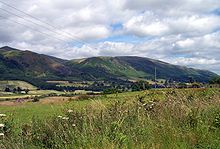This article needs additional citations for verification. (April 2019) |



The Ochil Hills (/ˈoʊxəl/ ;[2] Scottish Gaelic: Monadh Ochail[3]) is a range of hills in Scotland north of the Forth valley bordered by the cities of Stirling, Perth and the towns of Alloa, Kinross, and Auchterarder . The only major roads crossing the hills pass through Glen Devon/Glen Eagles and Glenfarg, the latter now largely replaced except for local traffic by the M90 Edinburgh-Perth motorway cutting through the eastern foothills. The hills are part of a Devonian lava extrusion whose appearance today is largely due to the Ochil Fault which results in the southern face of the hills forming an escarpment. The plateau is undulating with no prominent peak, the highest point being Ben Cleuch at 721 m (2,365 ft). The south-flowing burns have cut deep ravines including Dollar Glen, Silver Glen and Alva Glen, often only passable with the aid of wooden walkways.
The extent of the Ochils is not well-defined but by some definitions continues to include the hills of north Fife.[4]
Historically, the hills, combined with the town's site at the lowest bridging-point on the River Forth, led to Stirling's importance as a main gateway to the Highlands. They also acted as a boundary with Fife. Castle Campbell was built at the head of Dollar Glen in the late 15th century (an earlier castle on the site had been called "Castle Gloom") mainly as a very visible symbol of the Campbell domination of the area. Sheriffmuir, the site of the 1715 battle of the Jacobite rising, is on the northern slopes of the hills. In the early Industrial Revolution, several mill towns such as Tillicoultry, Alva and Menstrie (the Hillfoots Villages) grew up in the shadow of the Ochils to tap the water power. Some of the mills are open today as museums.
Blairdenon Hill was the site of one of the Beacons of Dissent during the G8 protests in July 2005.
- ^ ASN Wikibase Occurrence # 166966 – Aviation Safety Network
- ^ G.M. Miller, BBC Pronouncing Dictionary of British Names (Oxford UP, 1971), p. 110.
- ^ "Ainmean-Àite na h-Alba (AÀA) – Gaelic Place-names of Scotland". www.ainmean-aite.scot.
- ^ Cite error: The named reference
glasgow.ac.ukwas invoked but never defined (see the help page).